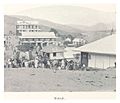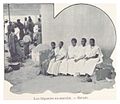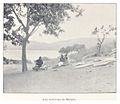Matadi
Matadi | |
|---|---|
 | |
| Nickname(s): The Stone City | |
 Matadi Location in the Democratic Republic of the Congo | |
| Coordinates: 5°49′03″S 13°28′15″E / 5.81750°S 13.47083°E / -5.81750; 13.47083 | |
| Country | |
| Province | Kongo Central |
| Founded | 1879 |
| Government | |
| • Mayor |
Jean Marc Nzayidio |
| Area | |
| • Total | 110 km2 (40 sq mi) |
| Population (2007) | |
| • Total | 306,053 |
| Time zone | UTC+1 |
Matadi is the chief sea port of the Democratic Republic of the Congo and the capital of the Kongo Central province. It has a population of 245,862 (2004). Matadi is situated on the left bank of the Congo River, 148 km (92 mi) from the mouth and 8 km (5.0 mi) below the last navigable point before the rapids that make the river impassable for a long stretch upriver. It was founded by Sir Henry Morton Stanley in 1879.
Contents
1 History
2 Culture
3 Climate
4 Infrastructure
5 Port
6 Media
7 Gallery
8 References
9 External links
History

The market, 1899
Matadi was founded by Sir Henry Morton Stanley in 1879. It was strategically important because it was the last navigable port going upstream on the Congo River; it became the furthest inland port in the Congo Free State. The construction of the Matadi–Kinshasa Railway (built between 1890 and 1898) made it possible to transport goods from deeper within Congo's interior to the port of Matadi, stimulating the city to become an important trading center. Portuguese and French West-African commercial interests influenced the city's architecture and urban design, which borrowed from the neighboring colonies in Angola and the Congo-Brazzaville.[1]
Culture
The word Matadi means stone in the local Kikongo language. The town is built on steep hills. A local saying is that to live in Matadi, you must know the verbs "to go up", "to go down", and "to sweat". Upstream is a series of caves known as the "rock of Diogo Cão", after graffiti carved by the Portuguese explorer in 1485 marking the limit of his travels up the Congo River.
Mount Cambier and the Yelala Rapids also lie near the city.
Climate
| Climate data for Matadi | |||||||||||||
|---|---|---|---|---|---|---|---|---|---|---|---|---|---|
| Month |
Jan |
Feb |
Mar |
Apr |
May |
Jun |
Jul |
Aug |
Sep |
Oct |
Nov |
Dec |
Year |
| Average high °C (°F) |
33 (91) |
33 (92) |
34 (94) |
34 (93) |
33 (91) |
30 (86) |
28 (83) |
29 (84) |
30 (86) |
32 (90) |
33 (91) |
32 (90) |
32 (89) |
| Average low °C (°F) |
24 (76) |
24 (76) |
24 (76) |
24 (76) |
24 (75) |
22 (71) |
20 (68) |
21 (69) |
22 (72) |
24 (75) |
24 (75) |
24 (75) |
23 (74) |
| Average precipitation cm (inches) |
13 (5) |
11 (4.3) |
17 (6.6) |
19 (7.4) |
6.1 (2.4) |
0.25 (0.1) |
0.25 (0.1) |
0.25 (0.1) |
0.76 (0.3) |
2.8 (1.1) |
17 (6.7) |
15 (5.8) |
101 (39.8) |
| Source: Weatherbase[2] | |||||||||||||
Infrastructure

Matadi train station, September 2015
The mouth of the Congo forms one of Africa's largest harbours. In addition to Matadi, which is the furthest upriver, three ports are located within it, the others being Boma and Banana in DR Congo and Soyo in Angola. Matadi serves as a major import and export point for the whole nation. Chief exports are coffee and timber. The state fishing company "Pemarza" uses the port to supply fish to Kinshasa. Tshimpi Airport is nearby but is reportedly inactive because of continued warfare.[citation needed]
Matadi Bridge, a suspension bridge 722 m- long with a main span of 520 m, built in 1983, crosses the river just south of Matadi, carrying the main road linking Kinshasa to the coast. After passing through Matadi and over the bridge, it continues to Boma, Muanda and Banana. Although built as a mixed rail and road bridge, no rail line is now operating over the bridge. Matadi is the port railhead for the 366 km long Matadi-Kinshasa Railway, constructed to bypass the rapids on the river upstream. A monument to the builders of the railway stands on a nearby hill.[citation needed]
A power station on the M'pozo River supplies power to Matadi.[citation needed]
Port

Port of Matadi, on the cover of trading cards from the Congo
The maximum draft of the port is 8.2m.[3] The Navy of the Democratic Republic of the Congo maintains one operational command at the port.
Media
La Cité africaine de Matadi is a newspaper published in French in Matadi.[4]
Gallery

Matadi, 1899

The market, 1899

A corner market in Matadi, 1899

Women at the market in Matadi, 1899

The market, 1899

The houses of Matadi, 1899

The surroundings of Matadi, 1899

Matadi port, circa 1942

Full Congo River at Matadi and the first rapids

Arrival at Matadi station

Map of Matadi and Vivi around 1890
Matadi in 1930s
References
^ History of architecture: city, architecture and
colonial space in Matadi and Lubumbashi, Sofie Boonen, "Archived copy" (PDF). Archived from the original (PDF) on 2014-07-14. Retrieved 2014-07-11.CS1 maint: Archived copy as title (link).mw-parser-output cite.citation{font-style:inherit}.mw-parser-output .citation q{quotes:"""""""'""'"}.mw-parser-output .citation .cs1-lock-free a{background:url("//upload.wikimedia.org/wikipedia/commons/thumb/6/65/Lock-green.svg/9px-Lock-green.svg.png")no-repeat;background-position:right .1em center}.mw-parser-output .citation .cs1-lock-limited a,.mw-parser-output .citation .cs1-lock-registration a{background:url("//upload.wikimedia.org/wikipedia/commons/thumb/d/d6/Lock-gray-alt-2.svg/9px-Lock-gray-alt-2.svg.png")no-repeat;background-position:right .1em center}.mw-parser-output .citation .cs1-lock-subscription a{background:url("//upload.wikimedia.org/wikipedia/commons/thumb/a/aa/Lock-red-alt-2.svg/9px-Lock-red-alt-2.svg.png")no-repeat;background-position:right .1em center}.mw-parser-output .cs1-subscription,.mw-parser-output .cs1-registration{color:#555}.mw-parser-output .cs1-subscription span,.mw-parser-output .cs1-registration span{border-bottom:1px dotted;cursor:help}.mw-parser-output .cs1-ws-icon a{background:url("//upload.wikimedia.org/wikipedia/commons/thumb/4/4c/Wikisource-logo.svg/12px-Wikisource-logo.svg.png")no-repeat;background-position:right .1em center}.mw-parser-output code.cs1-code{color:inherit;background:inherit;border:inherit;padding:inherit}.mw-parser-output .cs1-hidden-error{display:none;font-size:100%}.mw-parser-output .cs1-visible-error{font-size:100%}.mw-parser-output .cs1-maint{display:none;color:#33aa33;margin-left:0.3em}.mw-parser-output .cs1-subscription,.mw-parser-output .cs1-registration,.mw-parser-output .cs1-format{font-size:95%}.mw-parser-output .cs1-kern-left,.mw-parser-output .cs1-kern-wl-left{padding-left:0.2em}.mw-parser-output .cs1-kern-right,.mw-parser-output .cs1-kern-wl-right{padding-right:0.2em}
^
"Weatherbase: Historical Weather for Matadi, Democratic Republic of the Congo". Weatherbase. 2011.
Retrieved on November 24, 2011.
^ [1]
^ "Countries: Democratic Republic of the Congo: News" (Archive). [sic] Stanford University Libraries & Academic Information Resources. Retrieved on April 28, 2014.
External links
| Wikivoyage has a travel guide for Matadi. |
- Description of Matadi
Coordinates: 05°49′00″S 13°29′00″E / 5.81667°S 13.48333°E / -5.81667; 13.48333













Comments
Post a Comment